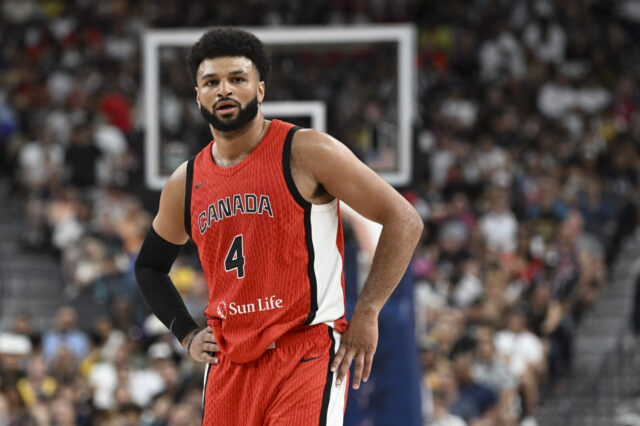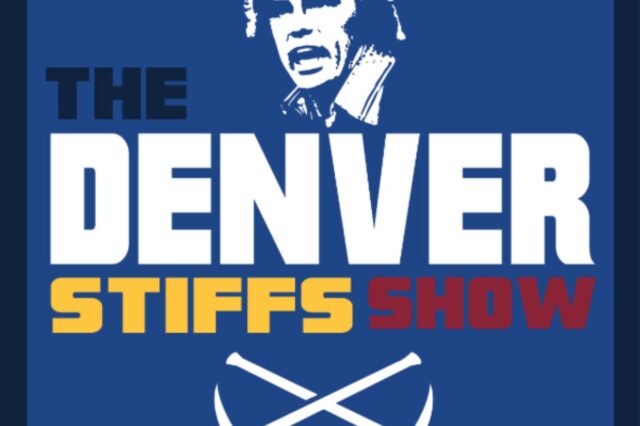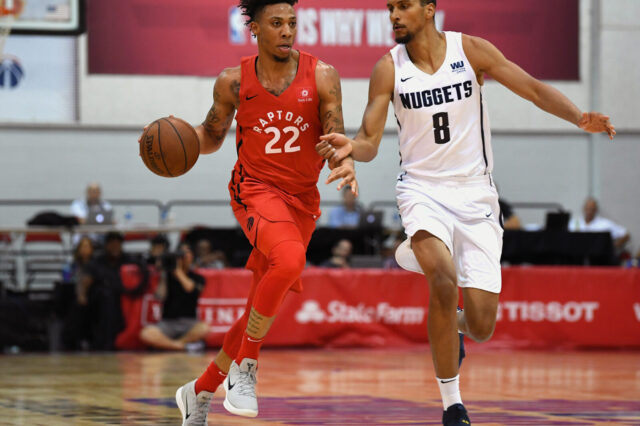Part two in a three part series with Denver Nuggets color analyst Scott Hastings, covering (just about) everything under the sun. If you missed yesterday, here’s part one:
Mike Olson, Denver Stiffs: We talked about all of those roles you’ve served in basketball. Player, coach, analyst, commentator, ambassador. Does having all of those different perspectives over your career change the way you see the game?
Scott Hastings: I have to think it does. A couple of things on this. I was blessed over my college and pro career to have played for and learned from a number of Hall of Famers. I played for Eddie Sutton. I played for Hubie Brown. I played for Mike Fratello. Short stints with Kevin Loughery and Ron Rothstein. I played for Chuck Daly. I played for Dan Issel. I mean, right there, I’m being taught by four or five Hall of famers, and some other really amazingly talented guys who touched my life.
There’s not a game that goes by that I’m not sharing something I learned from one of them. How to play when you’re hurt. Playing when you’re in foul trouble. How to get others involved. How to come off the bench and be able to get into the flow of the game. Hundreds of other things. It makes up all these little things that I’ve learned from these great coaches.
Look at that list. It’s not just Hall of Famers, it’s just phenomenal all of the things those guys have done. I am very highly motivated by all of that. I came to love it so much, I expanded on it. I started to make time to talk to great coaches that I never played for. Over the years, I sat down with Ceal Barry, and learned a ton from her. I went to DU and learned a bunch from Pam Tanner while watching her practices. Watching George Karl run practices, and Mike Malone. Learning how they structure things. It’s all an education to me.
So, when I watch the game, and talk about the game, my job is to try to effectively bring the game to the viewer. My time with those coaches formed what I’m trying to do in my analyst work: I try to give you a coach’s perspective. As far as what you’re seeing, what might be going through the player’s and coaches’ minds, a sense of why they were happy or unhappy. An example would be when they might be unhappy with officials. I try to give the coaches perspective, or the closeup perspective. Something like illustrating that the official who is making the call may be out of position. The coach is the one usually seeing that. So first, everything I broadcast, I try to share the coaches mentality. Second, I try to feed that back in a layman’s vocabulary. Not everyone will understand as I try to talk about the “pin-down” or “elbow” or other terms that might not be as familiar. I try to simplify it. One, because I’m not smart enough, and two, to try and keep it more straightforward for everyone. So, I look at it as a coach, and then I want to explain it as if I’m teaching. Does that make sense?
Stiffs: It not only makes sense, but as I think about listening to your game calls, I feel as if you achieve it. I’ve mentioned my bias, but I think you do that part exceptionally well, and it’s a part of why I enjoy listening to your broadcasts. I love basketball, but often don’t “get it” the way a guy like our Adam Mares does. He’s breaking down plays, and I’m always blown away. I learn somethng about basketball every time Adam breaks things down. In the same view, I am trying to figure out what the hell just happened. Your approach, the coaches view in simple words for simple guys like me, makes it more accessible. I can understand what just went right or what just went wrong and broke down.
Hastings: That’s what I mean. I want to not only talk about what might have gone wrong and broken down, but how they might be able to fix it and make it better. You asked about how my past roles shaped how I see the game. I truly think that out of all of my past experiences, my time as a coach most changed how I call the game as a broadcaster.
Stiffs: It’s obvious in our chats how much the coaching meant to you. You learned from the greats. I loved the exceptional list of coaches you threw out there, with some huge names in the mix. What a great set of teachers when you’re actively seeking to learn. I’ve got a different list of names I want to throw at you, and you tell me if you can guess at my common thread…
Dikembe Mutombo. Dominique Wilkins. (Scott starts to chuckle, I made this one too easy. He readily says, “yup” after every name I throw out hereafter.) Bernard King. Isiah Thomas. Dennis Rodman. LaPhonso Ellis. Doc Rivers. Tree Rollins. I have about 22 more highly recognizable names I can throw out here, but what am I driving at, Scott?
Hastings: Let me give you a few more… Joe Dumars, Vinnie Johnson, Bill Laimbeer, Dan Roundfield, Pearl Washington, Jon Sundvold… I have played with some great players, that’s for sure.
Stiffs: I shouldn’t have followed the Scott Hastings coaches list with that, that was dumb. You figured that out two names in. But yes, you’ve played with some huge names. With a murderer’s row like that… who was the best player you ever played with?
Hastings: Whoooo… Well…
Stiffs: (Laughing) If I’m getting you in trouble here, we can just move on…
Hastings: No, it’s just a tough question to answer. It comes back to a similar question to Bill Clinton’s old question asking what does “is” mean… But here, it’s what does “best” mean. I mean, if you just mean the best pure scorer, who could do crazy stupid stuff and even today no one would probably be able to guard, it’s Dominique Wilkins. I mean, he was simply incredible. Freaky. Just amazing what he could do.
But the smartest player I ever played with was Isiah Thomas. He was brilliant. Not just in the moment, but in the broader arc of the season. Here’s an example: We were on a bus somewhere to head out on a winter road trip, and Isiah is looking at the newspaper, telling us we’ve got to win five of our six games on this road trip. When you asked him why, he said, “because we have to have a better record than Portland.” Portland? I’m saying that the Lakers are the team we need to be ahead of, as they are leading the West at that point. Isiah is looking at the remaining schedules for each of the other teams in the league, and figuring out who will be leading the West by the end of our road trip, and also by the end of the season. He says that we need to outpace the record he sees for Portland through the course of the rest of the season. This is in January or February.
Well, sure enough, Portland passes the Lakers during that road trip. As Isiah said, we end up playing Portland in the NBA Finals, and we have home court advantage because of our record. Now, we didn’t end up needing home court, as we beat them in Portland as well, but he knew by the first of the year who we’d be playing, and what record we’d need to have home court over them. It was uncanny. He was by far one of the smartest players I’ve ever known.
Joe Dumars was quietly one of the best players I ever played with. He was so good, and he just loved playing so much. I remember standing by his locker, and a reporter asking him, “Joe, you’ve got a few games left in the season, you’ve played more minutes than anybody else this year. You appear to have this locked up, are you going to ask Chuck for a couple games off?”
Joe didn’t miss a beat. He said, “My dad lost his lower leg to diabetes, and I’ve never heard him say a word of complaint once. You think I’m going to complain because I end up getting a lot of minutes playing basketball, a game I love?” The reporter didn’t know what to say. The best part was it wasn’t contrived, Joe just honestly just wanted to be out there. He was one of the most genuine guys I ever got to play with. In fact, the only jersey of any other player I’ve ever collected, as I don’t collect them, is a Joe Dumars jersey. It’s the only other player’s jersey that I own, so… that says something about what he means to me. A deep-thinking guy who was just crazy talented.
Vinnie Johnson could get hot, and nobody in the world could stop him. Dennis Rodman could guard Kareem one night and Michael Jordan the next night, and I’ve never seen anyone else who could do that like that. What’s best? I’ll be honest with you, even Bill Laimbeer, for all his faults, was super intelligent, and I think honestly got more out of his body than any other single player that’s ever played. Bill was not super quick, not super fast, slow release on his jump shot. Yet, he ends up scoring nearly 14,000 points with over 10,000 rebounds. I was fortunate in so many ways about who I played with.
But that’s part of why I don’t think about “best player” thing much. That’s the individual. More than individuals, those Pistons were special. I’ve tried to share this, especially doing talk radio, but it’s a tough thing to communicate fully. Let me say it like this: If you’re a 50-win team in the NBA, you’re doing something. That is currently something of a high-water mark. You win 50 games, you’re a pretty good team. But there’s such a huge difference between wining 50 games and winning an NBA Championship. The difference in mentality you have to have between winning 50 games and winning a Championship is astounding. It’s really not even close. I was on a talented Atlanta Hawks team where two or three years in a row we won 50-plus games. But would always get beat by the Celtics or the Pistons in the playoffs.
Then the Pistons, the year we won it all, we won 59 games in the regular season. But that number didn’t matter. It was a Championship mentality, and it was a different vibe than a team that just wins regular season games. I learned that in Detroit, and it is amazingly difficult to try to explain to people. But you can feel it. The difference between a Championship team and a very good team.
Stiffs: That’s really interesting to hear, and I feel like you’re getting close for me to understanding it. I think it’s something very tangible for the folks like you who have experienced it, but I can see why it’s not easily defined, and I wonder if it’s because of what you said. It’s the responsibility of the collective instead of the individual. That makes it really rare, because everybody has to be bought in. You really steered away from that “best player” as being important, or easily defined. Keep going, I want to see if we can put more shape to it.
Hastings: Well, like I said, I was on good Atlanta teams that went to the playoffs every year, and usually won our division, and we just didn’t understand yet how to be that championship team. And then the year they broke us up, the year of the expansion draft, I got drafted away by the Miami Heat. Randy Whitman goes to Sacramento, Tree Rollins gets traded away, and all three had different roles, all three had some sort of leadership and voice in the locker room, and it lost something. They brought in Reggie Theus and Moses Malone, trying to patch it up, but management just didn’t understand the chemistry of a championship team.
Maybe here’s the thing: A championship team has to go through bad times together and stay together, and then figure it out together. They’ve got to feel some sort of success and failure, and then stay together.
That was that Atlanta team. We almost made it that last year before they broke us up. We took Boston to seven games and lost that game seven in Boston. I think we were right there. Had we won that series, I’m not so sure we couldn’t have played well with the Lakers that season in the Finals. We’d owned Detroit that year, but the Celtics were always our bugaboo, and we were still that close.
The team gets broken up the following year. That was really tough. It all boils down to philosophy. It starts out with ownership and management, that championship mentality. It’s not just about talent, it’s about everybody being on the same page, and filling their role. A good example: you look at some of those 76ers teams in the 70’s and 80’s, they had all the talent in the world, but they only got the one championship. I think I remember that at one point they had something like eight All-Stars on that team. But the chemistry was really only great their championship year.
Stiffs: Some good stuff there. People always talk about successful teams in terms of how the pieces mesh, but that’s just the top layer. It’s also about the common thread they share together, maybe including that need to have those tough times to come back from and surmount collectively. That’s a compelling element. You think about the Pistons and Bulls of that era finally crossing those hurdles. Detroit finally getting past the Celtics, and then Chicago past those same Pistons. Eventually those trials shape them into something bigger, something more. It makes sense, from a “refiner’s fire” sort of a perspective.
Hastings: Most teams have to do that, you know. Golden State might seem like the exception, but even they went through making shifts and firing a coach when they didn’t quite have the right mix, but kept that key core together. And that key core still had some hurdles to clear before they became who they are. Everyone thinks they didn’t have trials, but that’s just because now they have the three best shooters in the league.
Stiffs: It’s true. You see them destroying the competition now, and forget they struggled prior. That transition era is a sore spot for many Nuggets fans. And now, you’re right. It does seem like they got the cheat codes with those three shooters.
Hastings: You want to put them 1-2-3, in Durant, Curry, and Thompson, and maybe not even in that order. You play in a league now that totally values the three-ball and all three of the best shooters in the NBA play for one team.
Stiffs: Makes it a little simpler on their part than anyone else’s.
Hastings: Oh, yeah. For sure.
Stiffs: If only it had worked out like that when Alex English and Kiki Vandeweghe were first and second in the league in scoring. Some compelling stuff here, sir. I want to get around to chatting about today’s Nuggets, so the readers don’t kill me. You up for a little more?
Hastings: You bet!
*** We’ve got one more day to go, Nuggets Nation, and tomorrow ties all of the past two days chat into Scott’s thoughts about what’s coming and what’s needed for your favorite team. Come back tomorrow for part three! If you missed part one, it’s only a click away. ***


